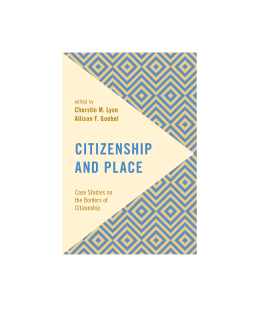
Additional Information
Book Details
Abstract
This book explores the ways in which individuals and groups negotiate the meaning and rights associated with their citizenship or lack thereof within the context of diverse interpretations of "place." Place might be a specific location as in the place where a person is able to work, or live, or it may be more metaphorical, as in the spaces created to organize protest online. Place may even be defined by its absence or distance, as is the case with refugees and stateless individuals.
Chapters in the first half of the book examine citizenship and place within the city. The second half examines citizenship and place beyond the city, beyond the nation, and in the case of statelessness, even beyond citizenship. The volume ends with a chapter that asserts that all citizenship is local. Citizenship, when examined from the ground up within the context of place, can capture conflicts and negotiations around belonging and rights that include those who are refugees, those who are stateless, and those whose very presence and demand for rights defy normative or state-driven definitions of who has the right to claim rights based on citizenship. This book seeks to help the reader push traditional boundaries and critically examine notions of citizenship in these spaces.
Cherstin M. Lyon is an associate professor of history and coordinator of a graduate program in social science and globalization at California State University.
Allison Goebel is a professor in the school of environmental studies with cross appointments in gender studies, global development studies and sociology, Queen's University, Canada.
Cherstin M. Lyon and Allison F. Goebel’s Citizenship and Place takes a collection of essays about place (especially physical, but also metaphorical), belonging, and rights, and forges them into a tightly focused book. The essays in turn effectively support the editors’ argument that the citizen’s right to have rights is shaped by local experience, conflict, and practice.
Marc W. Kruman, Director, Center for the Study of Citizenship, Wayne State University
Contributors to this interdisciplinary volume make clear how pressing contemporary issues such as statelessness and the structural problems of neoliberalism are locatable in the physical spaces and conceptual places of urban environments. Citizenship and Place is a valuable reference point for scholars interested in the geographic circulation of citizenship issues in cities from Buenos Aires to Detroit to East Jerusalem.
Richard Marback, Centre for the Study of Citizenship, Wayne State University
Table of Contents
| Section Title | Page | Action | Price |
|---|---|---|---|
| Contents | 7 | ||
| Acknowledgments | 9 | ||
| Introduction | 11 | ||
| Part I: Citizenship and Place in the City | 23 | ||
| 1 Insurgent Cities and Urban Citizenship in the Twenty-First Century | 25 | ||
| 2 Gender, Place, and Citizenship in Urban South Africa Post-1994 | 59 | ||
| 3 Graduated Sovereignty and the Fragmented City | 93 | ||
| 4 Jus Situ? | 127 | ||
| Part II: Beyond the City, Beyond the Nation, Beyond Citizenship | 161 | ||
| 5 Separate, Excluded, Unequal | 163 | ||
| 6 Categorization and Differential Citizenship within Neoliberal Context | 189 | ||
| 7 Statelessness as a Form of Citizenship among Tibetan Exiles | 209 | ||
| 8 The Hmong of Zomia | 243 | ||
| 9 All Citizenship Is Local | 275 | ||
| Index | 307 | ||
| Contributors | 315 |
